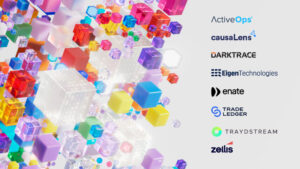
The Opportunities and Responsibilities of AI

We use AI in our everyday lives, sometimes more than we realise. Our smartphones get us from point A to point B, our assistants tell us what appointments we need to be at, our intelligent search engines recommend movies and TV shows we might want to watch. Real-time translation features in Skype and PowerPoint allow us to cross language barriers with colleagues all around the world.
These are scenarios you’d expect AI to be showing up, but increasingly we’re starting to see AI in creative and unexpected places. For example, Shakespeare. This is a wonderful project from Phil Harvey that uses sentiment analysis to map the entire works of Shakespeare. In particular, it offers some really interesting insights into the power AI and the limitations of AI.

Interestingly it’s Romeo, the blue line, that shows the most emotional volatility across the story. No matter how big a fan you are of Shakespeare, no human has the capability to read his entire works and provide detailed character analysis in just one sitting. But AI has the power to do that. However, when you dig a bit deeper and you run the AI over some of his more complicated works, like Hamlet for example, you start to see the AI really struggle to understand. Things end up looking positive to the algorithm that aren’t intended to be positive, and vice versa.

Hamlet is one of the most well known tragedies in the world, yet the AI recognises it as a happy story. This is a great example of the power and limitations of AI, and at least with respect to this particular type of data set, maybe it says that only humans are uniquely able to comprehend the richness and depth of emotion, and decipher the true meaning of the author.
We have no doubt that AI will power the next wave of digital transformation. We’re working with companies, large and small, in every industry sector, who are already starting to use AI to explore how they improve their value proposition, create new revenue streams and improve the productivity of their employees.
According to a recent report from McKinsey, AI could add £10 trillion to worldwide economic output by 2030. Here in the UK, it could add up to £230bn to our economy, making it one of the most significant economic opportunities of our time. This could be critical for the future economic success of the UK.

Looking ahead, we believe AI to be more game changing than any technological advance that came before it. It’s taken us nearly four decades to put a PC on every desk and a smart phone in every pocket, but the pace of AI deployment will be much faster, and its impact more profound.
But it’s not exactly new – AI has been around since Alan Turing was cracking codes at Bletchley Park during the second world war. So what is it that is actually accelerating this AI revolution? It comes down to three things.

Firstly, it’s the explosive growth of data. We see connected consumer devices and IoT sensors producing more data today than humans can possibly make sense out of. It’s estimated that two quintillion bytes of data are created every day, and that’s more than 15 million text messages, and staggeringly, 100 million spam emails every minute.
It’s also the power and pervasiveness of cloud. Cloud is what enables the efficient and rapid analysis of all this data. Microsoft is investing billions of dollars on a global cloud infrastructure to ensure we can deploy AI quickly and at scale.
So the explosive growth of data and the power and pervasiveness of cloud computing combined are enabling the development of increasingly powerful algorithms than we’ve ever seen before, capable of reasoning over all of this data and predicting outcomes with increasing accuracy. The pace of change with these dynamics is why we believe that the time to embrace AI in your organisation is right now.
AI isn’t only about economic opportunity, it’s also about the power to create very positive societal impact, and really be used as a force for good in the world. To realise that, we’ve launched a program called AI for Good, which is a program focused on the three key areas you see here.

AI4 Earth is all about using AI to drive sustainable environmental impacts for our planet. AI4 Accessibility is about using AI to improve the quality of life for the more than 1 billion people on the planet with disabilities. And AI4 Humanitarian Action is about using AI to help with disaster and recovery relief, and to deliver aid to those in need.
As optimistic as we are about AI, we’re also very aware of the responsibilities that we have in this space. AI has the potential to create unintended consequences. It’s critical that we design, develop and deploy this technology with a huge amount of care. The question we should ask is not what can we build with AI, but what should we build with AI. In answering that question, it’s vital to adhere to clear principles of ethics and fairness, accountability, privacy and security. Our ability to realise all of these incredible benefits from AI depend fundamentally on our ability to build trust in the technology.
One of the unintended consequences is, of course, the risk of job displacement. Despite all of the positive predictions that AI will be a job creator over the next decade, if it takes decades to retrain people then there’s a risk that we leave an entire generation behind. While we look forward to all of the amazing new career paths that AI will open, the reality is that we need to intensify our efforts to prepare today’s workforce for the jobs of tomorrow with the right digital skills and digital capabilities. Success tomorrow requires action today. Building digital skills is a shared responsibility for us, for the private sector, for government, for educators. We need to work together to create the opportunities for life-long learning to connect jobs and workers, and to ensure that no one is left behind.

A new program that Microsoft UK will be launching is the Microsoft AI Academy. The Academy will be helping develop practical AI skills, learning and certification for customers and partners. It’ll run both face-to-face and online training sessions for business leaders, IT Professionals, developers and start-ups. Given our own internal commitment to continuous learning, we’ll be using the academy to skill up our own employees as well.
To empower you and your organisation to achieve more with AI, we want to ensure that we have the most AI-enabled workforce and partner ecosystem. More details about the AI Academy with be shared in the coming weeks.
In addition to our commitment on skills, we also want to remain at the forefront of what the UK business community is thinking and feeling about adopting and using AI in their organisations. We are sharing a new research report called Maximising the AI opportunity, which provides a powerful lens on how successful UK businesses are already integrating AI into their operations.

This research, in conjunction with Goldsmith’s University of London, combines a comprehensive set of interviews with industry experts, academia, government, along with an extensive barometer survey of over 1000 business leaders and 4000 employees.
The research gives us a clear picture of where UK organisations are already on their AI journeys, and how they feel it will impact their organisations in the future.
[This article is based on Cindy Rose’s keynote at Future Decoded 2018]
Resources
- Microsoft Learn is the fun, free, easy way to learn Microsoft technologies.
- docs.microsoft.com is the home for Microsoft documentation for end users, developers, and IT professionals.
- Download the Maximising the AI opportunity report.
- Learn more about Microsoft and AI.




